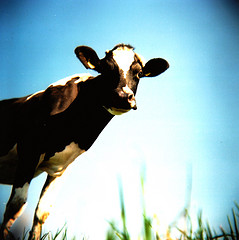The Atlantic Chapter of the Sierra Club, with a coalition of environmental groups, has filed a lawsuit against the New York State Department of Environmental Conservation (DEC) for its deregulation of industrial dairy farms with 200 – 299 cows.
The DEC has rolled back clean water standards to allow medium-sized dairy CAFOs (concentrated animal feeding operations) to operate without a permit, in clear violation of both federal and state law, with the likely result that untreated cow manure will run off into and contaminate nearby waters.
 |
| CC image courtesy of JelleS (Flickr) |
Less than a year ago, in a filing with the U.S. Environmental Protection Agency, the DEC asserted that a non-regulatory approach to medium-sized CAFOs, the same approach it is now taking, would be “neither credible nor effective” to protect the health and environment of New Yorkers. Just six weeks later, Governor Cuomo announced that New York would weaken its environmental protections by exempting some medium-size industrial dairy operations from its CAFO permit program. At the time, business for state producers of Greek-style yogurt was booming and it appeared their growth might be constrained by the supply of milk from New York dairy farms.
"Factory farms are one of the greatest sources of water pollution in the country,” said Robert F. Kennedy, Jr., president of Waterkeeper Alliance and chief prosecuting attorney for Riverkeeper. “Deregulating an already dirty business in other states has destroyed water quality and done nothing more than put money in the hands of a few corporations at the expense of the public. It is a shame that New York would want to follow that terrible precedent, rather than support family farms with the resources they need to operate in a way that protects the water quality we’ve fought so hard to maintain.”
Paul Gallay, president of Hudson Riverkeeper, said the state’s action is “a textbook case of sacrificing the environment in a misguided attempt to advance economic interests. Rather than eliminating these regulations, which had been on the books for years, the state should have assisted farmers in meeting those standards.”
The groups filed formal comments in response to Governor Cuomo’s proposed rule-making in January 2013, stating that DEC had not adequately reviewed the human health, environmental, and economic impacts of its action. An independent team of experts in agricultural waste management also reviewed the proposed rule changes and concluded that without clean water protections, “human health risks are substantial.” In addition, these experts concluded that the proposed rule changes “would likely result in increased environmental degradation of water, soil and air quality.
The lawsuit raises a number of claims, including that:
• DEC exceeded its regulatory authority by creating a loophole for industrial dairies in the Water Pollution Control Law, undermining the legislature’s intent to prevent discharges of pollutants.
• DEC did not adequately examine all adverse environmental impacts nor fully consider alternatives.
• DEC failed to obtain EPA approval as required prior to revising Clean Water Act permitting standards.
• DEC violated the Clean Water Act and state law by making its CAFO Permit Program less stringent than the minimum Federal requirements.
"The false narrative that water quality protections are suppressing milk production will hurt everyone in the long run,” said Roger Downs, conservation director for the Atlantic Chapter. “Clean water is a central element to any successful dairy farm and removing protections that keep manure out of our rivers and streams will only make people sick and harm the quality of milk and the products made from that milk. "
Recreational fishing and drinking water will also be negatively impacted throughout water systems where the new regulations allow the spreading of cattle manure.
The lower Susquehanna River is thick with algae, mostly from agricultural pollution. More pollution in New York’s section of the river will undermine Pennsylvania's implementation of pollution reductions to heal the river and Chesapeake Bay.
The Atlantic Chapter is joined in the lawsuit by Citizens Campaign for the Environment, EarthJustice, several Riverkeeper groups, the Theodore Gordon Flyfishers and the Waterkeeper Alliance.